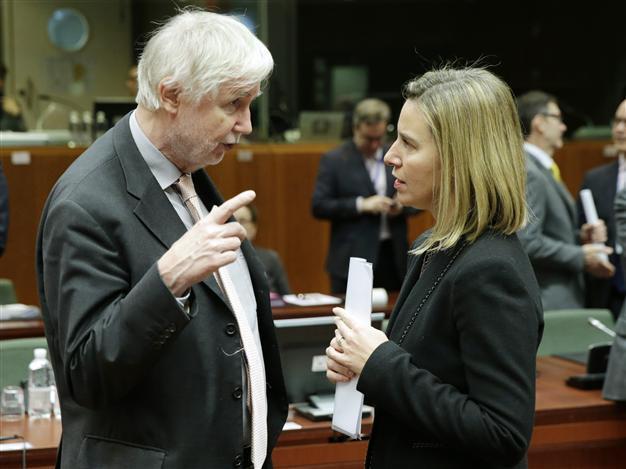EU backs UN drive for Aleppo ceasfire
BRUSSELS - Agence France-Presse

EU Foreign Policy Chief Federica Mogherini, right, talks with Finland's Foreign Minister Erkki Sakari Tuomioja, at the European Council building in Brussels, Monday, Dec. 15, 2014. AP Photo
The EU backed UN efforts to arrange a ceasefire in Syria's second city Aleppo on Monday as one of the few good options left in a conflict which has claimed more than 200,000 lives.EU foreign affairs chief Federica Mogherini said special UN Syria envoy Staffan de Mistura had briefed foreign ministers Sunday on plans for a "freeze" between government and rebel forces in Aleppo.
The aim is a limited local truce to help ease the desperate plight of the civilian population and provide some way forward after repeated efforts to end the war have failed.
European Union foreign ministers would look "at what we can do to concretely support the UN ... what we can do to stop the war in Syria," Mogherini said as she arrived to chair their regular monthly meeting.
With few other options open, "it is time to contribute positively to a solution," she said.
The ancient city of Aleppo has been fought over mercilessly since a popular uprising against Syrian President Bashar al-Assad began in 2011.
Damascus wants the rebels to hand over their heavy weapons and allow the return of local administration officials to Aleppo.
The rebels in turn want a guarantee that the freeze will be total and not simply allow Damascus to redeploy its troops elsewhere.
The Syria crisis dominates the EU foreign ministers agenda Monday, with the 28-nation bloc fearing instability across the Middle East and the prospect of their citizens going to fight in a war from which they return home dangerously radicalised.
The ministers will also review the situation in Ukraine, with a meeting later Monday of the EU-Ukraine Association Council attended by the country's premier, Arseniy Yatsenyuk.
The council was set up under a landmark association accord which sparked the current crisis when then pro-Russia president Viktor Yanukovych ditched the deal late last year, sparking riots which led to his ouster.
The EU has adopted progressively tougher sanctions against Russia for its intervention in Ukraine and its annexation of Crimea in March which sparked a conflict claiming more than 4,600 lives since.
The foreign ministers meeting will also discuss Bosnia, with Brussels hoping to get a written government commitment to a programme of political and economic reforms needed to put the country back on track to closer ties with Brussels.
















